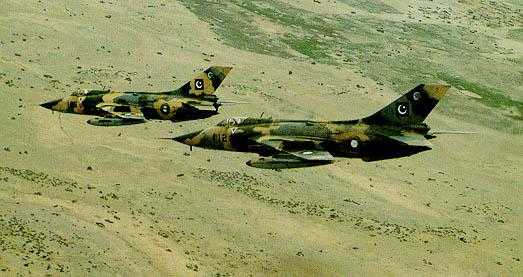

 Introduction: The A-5C is a single-seat, twin-engined, close air support and ground-attack strike fighter-bomber. The A-5Cs of the PAF have been employed exclusively in the ground attack role. Pakistan obtained 52 A-5Cs in 1983 which equip No. 16 and No. 26 Squadrons of the PAF. Background: Designed to meet a 1950s
requirement for a supersonic attack aircraft, the Qianjiji-5 (Attack aircraft
5) first flew on 4 June 1965. The Q-5 (A-5 for export) is a derivative
of the Shenyang F-6 (MiG-19) aircraft and was first designed in China in
August 1958 at the Shenyang facility. Responsibility was later assigned
to the Nanchang Aircraft Manufacturing Corp. (NAMC) facility. The prototype
programme was cancelled in 1961, but kept alive by small team of Chinese
aeronautical engineers and defence personnel. It resumed officially in
1963. The first flight of the Q-5 took place on 4 June 1965. The preliminary
design certificate was awarded
The aircraft was further modified, leading to the flight testing of two further modified prototypes from October 1969. The series production-run was approved at end of 1969 and deliveries began to take place in 1970. The A5-C (Q-5C) is the improved Q5-I 1976 version of the aircraft. It was flight tested in late 1980 and certified for production on 20 October 1981. The Q-5IA accounted for the type's first export success, namely 40 for North Korea. Keen to win further orders, Nanchang offered the Q-5IA for export as the A-5C (Q-5III). Incorporating 32 modifications of the Q-5 plus upgraded avionics and an added AIM-9 AAM capability, the A-5C was ordered by Pakistan (52 aircraft) and Bangladesh (20 aircraft). Development of the Q-5II in co-operation with Alenia of Italy subsequently produced the all-weather A-5M. Myanmar has ordered 24 such aircraft. Mission: The A-5C Fantan is deployed by the PAF as a close air support and ground attack aircraft. It also has the capability for air-to-air combat if need be. The A-5C has been modified to meet the PAF requirements in the special role of close air support as well as its primary role, ground-attack and deep penetration strike. The PAF A-5Cs have been modified to carry a single 5-20 kT nuclear bomb under the centreline along with two external wing mounted fuel drop tanks. In the event of nuclear attack, the PAF A-5Cs will be used primarily to deliver battlefield nuclear bombs over advancing enemy armoured columns. They will also be used for conventional as well as nuclear attack on enemy air bases, missile launch sites and strategic installations located within 1,000 km from the Pakistani border with air defence escort provided by PAF F-7MP fighter interceptors. Features: The A-5C is powered by two
Shenyang WP6 turbojets, each rated at 25.50 kN dry and 31.87 kN with afterburning,
mounted side by side in the rear of the fuselage. Armament includes one
internal 23mm cannon with 100 rounds in each wingroot; ten attachment points
normally for external stores; two pairs in tandem under centre of fuselage,
and three under each wing; fuselage stations can each carry a 250 kg bomb;
inboard wing stations can carry 6kg or 25 lb practice bombs; outboard wing
stations can each be occupied by a 400 litre drop tank or by air-to-air
missiles such as PL-2, Pl-2b, Pl-7, AIM-9 Sidewinder and R550 Magic. The
A-5C is
Another improved version Q5-K had been tested with French avionics, the programme was cancelled in 1989. It is equipped with a ranging radar and can carry two torpedoes or two YJ-8 sea-skimming AshMs (C-801, range 10-50km at Mach 0.9) for anti-ship mission. The latest model in service with AF may be equipped with HUD, ballistic computer, ECM pod, ALR-1 laser range finder/designator (to deliver newly developed LGBs) and Russia is also offering its Phazotron Komar PD radar to upgrade the Q-5. Basic Specifications: Primary Function: Ground-attack strike aircraft. Manufacturer: NAMC (China) Power Plant: Two Shenyang Wopen-6 (WP6) turbojet engines with afterburners. Thrust: 31.87 kn. (7,165 lb. st) Length: 53 feet, 4 inches (16.25 meters) Height: 14 feet, 10 inches (4.52 meters) Wingspan: 31 feet, 10 inches (9.70 meters) Maximum Takeoff Weight: 26,455 lbs. (12,000 kgs); Empty: 6,494 kg (14,317 lb) Speed: 1,190 km/h (740 mph) or Mach 1.12 at 36,000 feet (11,000 metres) Ceiling: 52,000 feet (15,850 meters); max rate of climb at 5000 m (16,400 ft) 4980-6180 m (16,340-20,275 ft)/min. Range: 1,243 miles (2,000 km) Armament: Two 23 mm internal cannons. Ten hardpoints points for carrying up to 2,000 kg (4,410 lb) of bombs (250 to 1000 kg bombs), Mk 82 or Snakeye, French Durandal, air-to-air missiles such as Chinese PL-2, PL-2B, PL-7, AIM-9 Sidewinder and Matra R.550, Magic, auxiliary fuel tanks. C-801 AshMs. Capable of carrying a single 5-20 kT nuclear bomb. Crew: One PAF Inventory: 51(current); 60 (original) Note : Additional
information available upon request.
COPYRIGHT © 1999-2002
PAKISTAN AIRFORCE ONLINE. ALL RIGHTS RESERVED, WORLDWIDE.
|